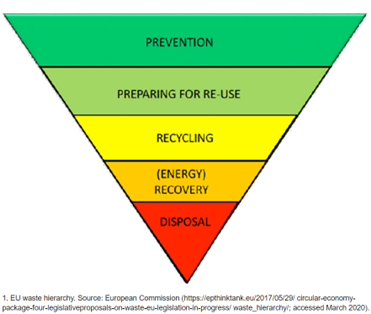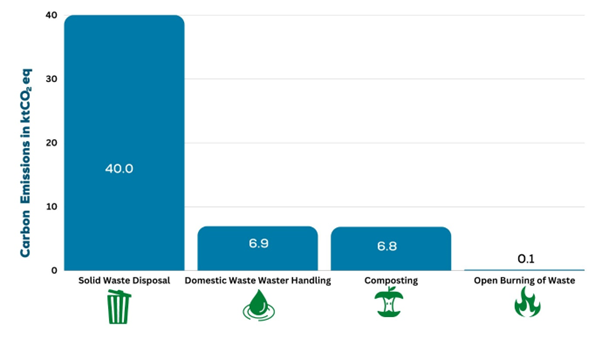Waste
Questions to bear in mind in this page -
- What do you think the Council should do to help reduce emissions from Waste?
- What would you like to do to reduce the emissions from waste in your own life?
What is the Challenge?
Waste is defined under the Waste Management Act 1996 as “…any substance or object which the holder discards or intends [to] or is required to discard” after the completion of an activity or process. The term is wide-ranging and is a complex area of environmental law. Greenhouse gas emissions arise from how the waste is treated after its life if it is burned in incineration to release carbon dioxide or if it breaks down in a landfill to release methane. Avoiding sending waste for disposal by repairing and reusing or eliminating the need for the product in the first place will reduce greenhouse gas emissions.

Where does the Council have influence
- Through the Green Schools initiative and other educational programmes, the Council raises awareness about responsible disposal of waste, recycling, upcycling etc.
- The Council has a network of bring banks where waste materials can be recycled and/or disposed of. There are also two civic amenity sites in Kilbarry and Dungarvan.
- The Council is responsible for the regulation of multiple waste activities under the Waste Management Act 1996. A team of environmental inspectors carry out inspections under the various regulations enacted under the Waste Management Act and related legislation and have various powers to enforce these regulations.
- Litter legislation
- Reusable cups
- To reduce levels of waste in Waterford going forward, the council will look to implement green public procurement principles. This will ensure that goods and services sourced by the Council are sustainable and low impact from a waste generation perspective.
What is the national picture
Ireland generated approximately 16.2 million (M) tonnes of waste in 2020, corresponding to 3.2 tonnes per person, up from 12.7 million tonnes (2.77 tonnes per person) in 2012.
The amount of municipal waste recycled has increased by 11% since 2016, but total waste generated also increased by 11%, so the recycling rate has stagnated.
Household waste has also grown by 27%, equivalent to over 400,000 tonnes, in the last five years.
At present only 41% of household waste is recycled, there is an urgent need to increase the municipal recycling rate.
What is the local picture
Under the Waste Management Act 1996, Waterford City and County Council is charged with regulating waste activities in Waterford. The council has a team of environmental inspectors that ensure waste regulations are enforced and maintained.
The Council is also one of 10 Local Authorities part of the Southern Waste Region. This body seeks to ensure compliance with relevant waste management laws and policies through strategic targets and objectives. These must tie in with Ireland’s National Waste Policy. This national policy was reviewed in 2021 and focus was strengthened on promoting a green and circular economy. WCCC will look to embody the principles of waste reduction, reuse and circularity going forward.
53.8 ktCO2 of greenhouse gas emissions in Waterford arise from disposal of waste.

What are other places doing
Circular Flanders, an organisation in Belgium, has been working with businesses and local government to move the area to a circular business model where products can be remade, reused and repaired. A good example of this is De Potterij, an abandoned building which has been turned into a hub for repair, renting, borrowing and refurbishing businesses.
Libraries of Things are places or parts of libraries where people can come and borrow the equipment that they need periodically such as a drill, a lawnmower or a tent. Waterford libraries have been lending out an Energy Kit for the last few years.
Community groups in the Netherlands started hosting Repair Cafes a number of years ago. A Repair Café is where volunteers do repairs on items for the local community. This year the EU Commission introduced a Right to Repair proposal which will provide consumers with the right to have their goods repaired and goods will be designed with repairability in mind.